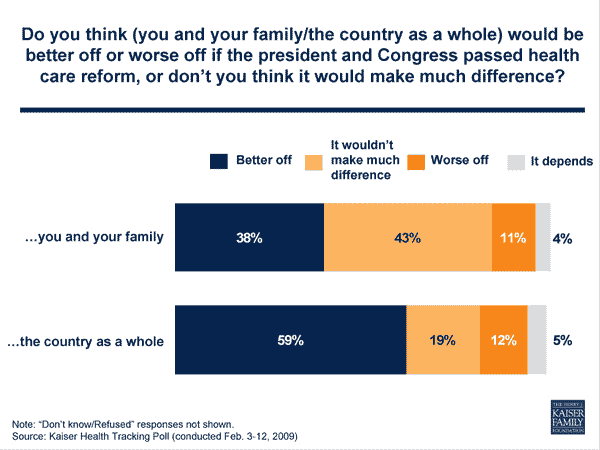Pulling it Together: What Will Health Reform Do For Me?
There is one poll number that may be more important to watch than any other if we have a big debate about health reform: The percentage of Americans who think that they or their families would be better off if the president and the Congress enacted major health reform legislation. It’s a number that signals whether people think that health reform legislation will actually help them with the problems they are having in the current health care system. Or, whether critics of health reform are successfully playing on the public’s underlying fears — fairly or unfairly, depending on your perspective — as they did in the last health reform debate in the early 1990s.
According to our latest tracking poll just out this week, 38% of the American people think that health reform would make them or their family better off and 11% think they would be worse off. Democrats, younger people, and lower income people are much more likely to think they would benefit. Forty-three percent of the American people think health reform will have no impact on them. Of those who think they will be unaffected, 38% are Democrats and more likely to be pro reform in general based on our polling; 24% are Republicans, who are less likely to favor reform; and 30% are independents.

A poll conducted by Time/CNN/Yankelovich in September 1993 — just before the Clinton health plan was formally introduced — found the public much more conflicted than today, with 20% saying they thought the plan would make them and their family better off, 21% saying they would be worse off, and 57% believing they would be unaffected. By that point, many interest groups had already started to mobilize against the plan. As the debate over the Clinton plan intensified, support for the plan fell as more people grew to believe — rightly or wrongly — that they would end up worse off. In less than a year the percentage of people who said the plan would make them worse off rose from a low of 21% in one poll to 37% in another. Observers often point to the fact that people feared the Clinton proposal might force them out of their current health care arrangements. That was undoubtedly a factor in undermining the plan.
The percentage of Americans believing that health reform will benefit them needs to go up and cannot go down if there is to be a public environment conducive to a comprehensive reform effort. Any major reform will require sacrifice or change by some. And, interest groups and opinion leaders who decide to oppose a reform plan — whether out of ideology or because it is harmful to their interests — will likely frame their opposition in terms of how the public at large will be affected. This is especially true in a deep recession, which both elevates public concern about the affordability of health care but also understandably makes people reluctant to want to spend more or make other sacrifices.
Answering the question “What will health reform do for me?” is more than a communications challenge. There are multiple agendas in health reform — to expand coverage for the uninsured, to reduce people’s health care bills, to begin the process of long-term reform of the health care delivery system, and to help balance the federal budget and rein in entitlement spending, just to name a few — and it is not unfair for people being battered on multiple fronts in a recession to want to cut through the clutter and ask “Will this help me?” The number of people answering yes to this question will be a critical barometer to watch.
